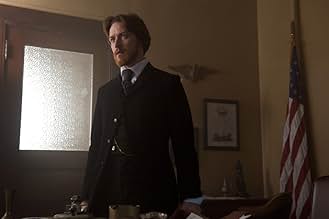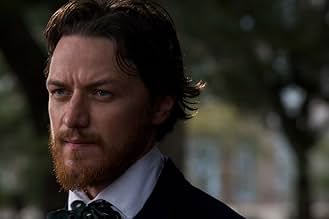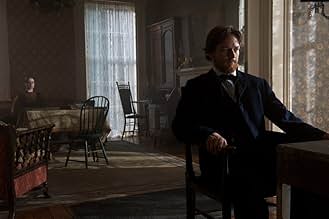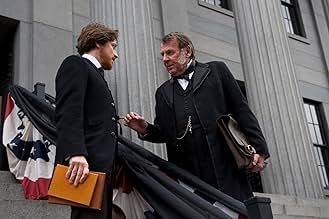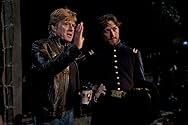Mary Surratt is the lone female charged as a co-conspirator in the assassination trial of Abraham Lincoln. As the whole nation turns against her, she is forced to rely on her reluctant lawye... Read allMary Surratt is the lone female charged as a co-conspirator in the assassination trial of Abraham Lincoln. As the whole nation turns against her, she is forced to rely on her reluctant lawyer to uncover the truth and save her life.Mary Surratt is the lone female charged as a co-conspirator in the assassination trial of Abraham Lincoln. As the whole nation turns against her, she is forced to rely on her reluctant lawyer to uncover the truth and save her life.
- Awards
- 2 wins & 3 nominations total
Featured reviews
Robert Redford has been well known for his political views and has displayed them already in the somewhat uneven Lions for Lambs. I like filmmakers who speak out. I can maybe not always agree, but I wholeheartedly admire that in this time of mindless action drivel like Transformers, Drive Angry and The Mechanic there is still hope for without trying to be arrogant: meaningful films. Redford uses the assassination of Lincoln to portray a nation in mourning and sadness. The Civil War was all but over and the policymakers were already planning the next step: the forming of a real Union. The assassination of Lincoln endangered the entire Union. The people wanted revenge and Edwin Stanton (an excellent Kevin Kline) serves it cold. Since her son is nowhere to be found anywhere, he settles for the next thing: his mother Mary Surrat. 'I don't care which one it is, as long as one of them pays the price'. Young Frederick Alken (James McAvoy) has the ungrateful task of defending her.
I don't know much about the Civil War and the period after that, so I can't say how accurate this film is. But what I can say is that it's a masterpiece in creating a period not so distant from our current world. If you replace the assassination of Lincoln with the 9/11-attacks, you have a film that stands firm. It asks relevant questions and holds a mirror right up to our faces. Are seeing clearly? In the sadness and outrage of such a shocking event, do we still see clearly what's going on? Do we still, as a people, have perspective enough to define friend from foe from guilty to innocent? Do our leaders have the capability, strength and courage to make us see or tell us 'no' when we are wrong? Or do policies, political views or elections hold them back and make them just give the public what they want? Mary Surrat, Lincoln, Osama Bin Laden, Afghanistan, Bush, Edward Stanton, Abu Grahib, post Civil War Washington, Guantanomo Bay. History repeats itself over and over again. When will we learn? Guilty or innocent. Is it important? Do we care? I give this film 8 out of 10.
Since the whole story is told from his point of view, it emerges as a realistic depiction of how events might have unfolded, taking no firm stand on the innocence or guilt of the accused. As the nation mourns the sudden death of its leader taken from them just as the Civil War ended, we are told that justice must be swift to heal the wounds of the public and satisfy a thirst for revenge. It's that viewpoint that makes this film relevant today, in view of other controversial historical events, but first and foremost the assassination of President John F. Kennedy in 1963.
One glaring quibble: Apparently, to fully immerse the viewer in this time of history and to suit the flavor of the grim tale, Redford has chosen to use very muted color photography so that this is almost a sepia tone experience. But do we have to be reminded so flagrantly that this was the candlelit era? Scenes outside of the courtroom could have used flashes of real color, as could the social circle interiors of other scenes instead of keeping the low-key lighting so constant. It became a distraction for me. He may as well have used glorious B&W.
Other technical aspects are fine and the background score is effective without becoming overwhelming. ROBIN WRIGHT PENN plays Mary Surratt with quiet dignity and strength. KEVIN KLINE is almost unrecognizable as the stubbornly determined EDWIN STANTON seeking quick justice, EVAN RACHEL WOOD is effective as the distraught daughter Anna Surratt, and JOHNNY SIMMONS is sobering as the accused woman's son who manages to escape imprisonment for his role in the John Wilkes Booth caper. His character, unfortunately, isn't fleshed out at all.
Biggest supporting role goes to TOM WILKINSON as the man who urges McAvoy to take the defense case against his wishes. He and McAvoy share most of the running time on screen and do magnificent jobs.
History buffs will no doubt find this more interesting than the average movie fan looking for a more adventurous look at the past, but despite flaws, it is competently made and does recreate the actual events in a satisfying manner by use of flashbacks and an intelligent script. But did it have to be so dark?
After the assassination of Lincoln, we follow not so much the trials of the conspirators, but the trials of lawyer Frederick Aiken (James McAvoy). McAvoy has quickly forged an incredible career where he has a propensity to play the man next to historical figures and provide us with an inside view (like the doctor to Idi Amin in "The Last King of Scotland" or secretary to Leo Tolstoy in "The Last Station").
Here, McAvoy is the very patriotic soldier-turned-lawyer defending Mary Surrat (Robin Wright), the lone female conspirator. The film focuses only on Surrat's part of the trial of the conspirators, mostly because this film is about her lawyer. A devout supporter of Stanton and the Union, Aiken believed that Surrat was guilty and spent just as much time proving her guilt as her innocence. His internal struggles accepting everything that he had to do and what he should do were rather profound. I also think they make up McAvoy's best performance of his career. Too bad that the Academy will have forgotten it by the time the Oscars come around.
Like the best historical dramas, Redford never comes out and says if he believes that Surrat was innocent or guilty. "The Conspirator" isn't about that. This is about the trial. His views on the use of a military tribunal versus a civil trial are clear.
I was blown away by the impeccable production, the cast, and the sheer atrocities committed by so many of the characters not on trial. There may have been a few artistic licences taken, but I doubt it was with the extremes to which some military personnel will go. The great Kevin Kline and the up-and-coming Johnny Simmons play the two least sympathetic characters in the movie. Phenomenal casting is just one the great aspects of "The Conspirator".
Did you know
- TriviaThe Surratt boarding house still stands in Washington, DC's Chinatown.
- GoofsWhen Booth is trapped and killed, he still has his distinctive mustache. He shaved his face soon after he killed Abraham Lincoln, to make himself less recognizable.
- Quotes
Edwin Stanton: Young man... always indebted to you for your courage in the field, but you must learn to tread lightly.
Frederick Aiken: Tread lightly? I will not tread lightly. You have predetermined her fate.
Edwin Stanton: Mary Surratt's fate rests entirely with the Commission. My concern is preserving our Union.
Frederick Aiken: Why did I fight for the Union if my rights aren't assured? You tell me.
Edwin Stanton: Fine words for rallying the troops, not for running a nation. They assassinated our president, and someone must be held accountable. The people want that.
Frederick Aiken: It's John Surratt you want. You don't even want Mary.
Edwin Stanton: I'll settle for either one.
- ConnectionsFeatured in The Conspirator: Mary Surratt and the Plot to Kill Lincoln (2011)
Details
Box office
- Budget
- $25,000,000 (estimated)
- Gross US & Canada
- $11,538,204
- Opening weekend US & Canada
- $3,506,602
- Apr 17, 2011
- Gross worldwide
- $15,625,544
- Runtime2 hours 2 minutes
- Color
- Sound mix
- Aspect ratio
- 2.39 : 1
Contribute to this page








